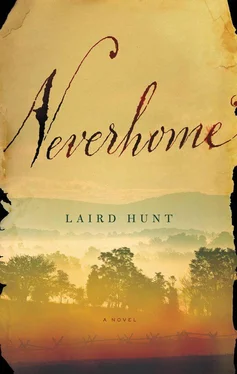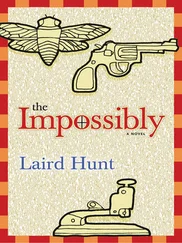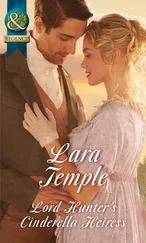“Yes, it sure was, Gallant Ash,” he said.
“They don’t call me that here,” I said.
He didn’t answer, just looked at me, his head tilted a little and his mouth open like you see sometimes on the dead. I stepped out into the rain, emptied the slops like it was real work for me, then came back under the roof and turned to him.
“You want to see how I did it?” I said, lowering my voice. “See me drop off my clothes? We got time. No one’ll notice. You want to see it done?”
He was quiet and had gone all autumn-apple-colored again but there was a minute I thought I’d misjudged him. There was a minute I thought he had aged up to go with that scrub beard of his I’d shaved off and was going to work his scrawny arms and lift his gun. I thought he was going to fire it at me and that I would fall down the slop hole and get stuck or splatter off down the stream. I think it was the pleasure I should have felt at this prospect but didn’t that brought me back, made me move.
I said, “I know you didn’t know all those days what it was I had hiding in my shirt. You know why I signed up? So I could get next to men, men like you.”
He coughed and gulped. He shook his head and bit at his lip. He kicked one of his boots against the other. He opened his mouth and tried to swallow. But he set his musket against the wall.
“Lean in close, now, and you can learn all the trick of it you like,” I said.
I had the wooden lid to the slop jar still in my hand. He set his tongue along his lips, leaned in close to my shoulder. I reached up with my free hand and ran a finger across his smooth cheek, then I swung up with the other and hit him hard.
“All you do for this trick,” I told him as I started unbuttoning his coat, “is change your clothes. You take yours off and put other ones on. Let’s try it now. You and me together. See how it works.”
So it was him wore the thin dress and walked in front with the empty slop jar as we went back. I had fixed his bayonet and bought his attention with a gentle slice to his side. I had told him if he so much as gave out a shiver as we went back to the cell I would put an end to his days. Like I had put an end to those outlaws we’d left in the woods.
“I never meant any harm,” he said.
“No, I expect you probably didn’t,” I said.
We walked. We passed a soldier or three but they were ones I hadn’t seen before and none gave us the barest look. I well knew how to walk like a man, and the Akron boy in my dress with his long golden locks made a maiden fairer than I. The keeper was on her chair in her room dozing over her coffee and porridge and did not raise her head as we passed. I put the Akron boy in the cell with the women, put a shackle on his leg, made him give me every countersign he knew, then tied a rag around his mouth. Even when he waved his arms at me and I saw again the angry wound on the top muscle of his left arm that I had already seen when I had made him undress in the yard, and that I would see in dreams to come, and can see again to this day, I did not waver. I yanked his mouth rag snug and left him there to wait. To wait to be stripped again of his guard duties, to be put back in the chair, marched out on his own bucket dreams, go back to the men’s quarters they had let him emerge from a minute, and moan out his fresh tale of woe.
“You tell them over there that Gallant Ash sends his regards,” I whispered at him.
Don’t leave me here like this, his eyes spoke back.
One of the heavy gals wasn’t heavy anymore came over at me when I was standing up from tying his rag, and I took a minute to pay her and her friend back for having stolen my food. The keeper, for her part of it, got the musket butt to the side of her head. I had not eaten in two days so I gobbled down what she hadn’t eaten of her porridge and drank her coffee and, before I left, sat a minute on her chair.

I expect anyone just come out of that place would have run about as fast as he could for the hills but run is not what I did. Instead, I walked out slowly through the front door, past the sleepy guards posted there, gave them each a good grin, got back a brace of grins in return, shouldered my new Springfield, and set off down the road and out of the town where the sick house was and back to the one where Neva Thatcher had her quiet little home. I passed many a footsore soldier along the way. They just nodded at me or asked for news, but I shook my head and said I had none to give. One fellow louder than the others called out about the Wilderness fight and how so many wounded boys had died of fire and not their wounds. There was a picket detail on the bridge led into Neva Thatcher’s town who liked the countersign I gave them and let me through. They had a battle going somewhere nearby and I went through town with an ammunition convoy dragged by tired, hoof-cracked mules.
The battle going on must have been somewhere picturesque without any burning boys to it because there was a party of handsome-dressed fancy people carrying field glasses fixing to ride out to inspect it. The oldest man of the group gave me a right smart nod when I went by, like he was looking forward to seeing me fight a little later in the day. I nodded back, then crossed through the mule train to the other side of the street. A little later I crossed back over and walked up the path and around the back and into Neva Thatcher’s house.
You could hear the battle about as well inside as you could outside but inside it was warm and neat. The old kind of quiet made of mists and dust-gloom reigned there. Neva Thatcher had her breakfast cup drying on the sideboard, and a pile of apples waiting to help get her through the week. She had salt pork and hardtack sitting next to a lump of lard in the cupboard. A stone jug of cool water from her well. In the side room I found her underthings and dresses folded neat. I chose a green-colored gown and a pair of sturdy shoes couldn’t have fit me much better and made a bundle of them with the food I had recruited from the kitchen. Then I went to the dining room.
The chinaware was dusted fresh, its flowers and animals sleeping quiet. Some of the afternoon sun was thieving in through the blinds and nibbling at it. There were motes adrift in the light. I lifted up a hand through some of it and made them swirl. I took up Neva’s grandaunt’s teapot by its handle, carried it to the dining table, lifted it, and started to bring it down. I had had it in my mind the whole walk there to break her chinaware and lay the broken pieces across her floor but holding the pretty thing in my hand, I found I could not do it and instead simply carried the teapot to her room and set it on her pillow. There where she laid her linden-berry head and dreamed her linden-berry dreams. She helped the wounded, shepherded the sick. She had helped me. Then she hadn’t. There it was. I could feel it. I had it again. I knew where she kept a mallet and I fetched it out and went back to her room and I pounded the china-pot heirloom on her bed pillow until its powders were floating up into the air. After I had finished, I stood awhile in front of the rest. Picked up one of the monkey plates. Thought some more. But in the end I put down the plate, dropped the mallet, and left Neva Thatcher’s house.
I went next to the camp outside of town. The pickets were down and I walked right through the camp and a few hundred yards more along a corduroy road to the rear line. Some of the mules I had walked with earlier were just shambling up. I passed a group of cooks playing poker with a second lieutenant in the shade of an apple tree. Men in reserve waiting to see if they would have a turn on the front line that day were dozing in the sun. I still had my coat on, and one or two eyed me a little closer than I liked so I took it off. There was a tall major wearing a stovepipe hat looked a minute like Abraham Lincoln who was swearing at his mount. The wounded were already coming through the trees. I saw one boy crawling with a slick of blood emerging from the corner of his mouth. Every couple of feet he would cough and the slick would spread. There were tears on his dusty cheeks. He kept looking around him and calling out for water. He was crawling to a grave would open up any minute and it made me tired to look at him so I went up to the rise where I had seen the commander’s flag.
Читать дальше













